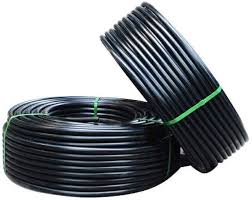Sep . 29, 2024 03:17 Back to list
High-Density Polyethylene Pipes for Efficient Drip Irrigation Solutions and Applications
The Benefits and Applications of HDPE Pipe for Drip Irrigation Systems
Drip irrigation is a highly efficient watering technique that delivers water directly to the roots of plants, minimizing waste and ensuring optimal moisture levels. Among the various materials used in the construction of drip irrigation systems, High-Density Polyethylene (HDPE) has emerged as a popular choice due to its durability, flexibility, and cost-effectiveness. In this article, we will explore the benefits and applications of HDPE pipe for drip irrigation systems.
What is HDPE?
High-Density Polyethylene (HDPE) is a thermoplastic polymer made from petrochemical sources. Its notable characteristics include high tensile strength, resistance to impact, and excellent chemical resistance. As a result, HDPE pipes are used in various applications, including water supply, sewage systems, and, notably, irrigation.
Advantages of HDPE Pipes in Drip Irrigation
1. Durability and Longevity HDPE pipes are inherently resistant to corrosion and degradation from various environmental factors. This longevity is particularly beneficial in agricultural settings where systems must withstand harsh conditions, such as ultraviolet (UV) radiation, soil chemicals, and temperature fluctuations. Many HDPE pipes can last over 50 years, making them a sustainable choice for irrigation.
2. Flexibility and Ease of Installation Compared to traditional materials like PVC or metal, HDPE is more flexible, allowing for easier installation across uneven terrains and around existing structures. This flexibility not only simplifies transport and handling but also reduces the need for fittings and joints, which minimizes potential leak points.
3. Cost-Effectiveness While the initial investment in HDPE pipes may be slightly higher than other materials, their durability and low maintenance requirements can lead to significant long-term cost savings. The reduced need for replacement and repair over time, coupled with energy-efficient irrigation practices, makes HDPE a financially attractive option.
hdpe pipe for drip irrigation products

4. Efficiency of Water Use Drip irrigation systems using HDPE pipes deliver water directly to the plant roots, significantly reducing evaporation and runoff. This targeted approach conserves water, making it an essential tool in regions facing water scarcity. Efficient water use not only benefits the environment but also leads to higher crop yields.
5. Versatility HDPE pipes are available in various sizes and thicknesses, making them suitable for a wide range of applications, from small gardens to large-scale agricultural ventures. They can be easily customized to meet specific project requirements, accommodating different types of crops and soil conditions.
6. Environmental Impact HDPE is a recyclable material, contributing to a reduced environmental footprint. Using recycled HDPE pipes in drip irrigation systems supports sustainable agriculture practices and promotes environmental responsibility among farmers.
Applications of HDPE Pipes in Drip Irrigation
HDPE pipes are widely used in various agricultural sectors. They are ideal for vineyards, orchards, and row crops, where precise water application is crucial for growth and productivity. Additionally, HDPE pipes can be employed in landscaping and residential gardening, providing homeowners and commercial properties with efficient irrigation solutions.
Moreover, in regions prone to drought or with limited water resources, HDPE pipe systems offer innovative solutions for water conservation. Municipalities and agricultural cooperatives are increasingly investing in HDPE technology to support sustainable farming and ensure food security.
Conclusion
The integration of HDPE pipes into drip irrigation systems presents numerous benefits that make them a compelling choice for farmers and landowners alike. Their durability, flexibility, and efficiency contribute not only to improved crop yields but also to conservation efforts in water-scarce areas. As agriculture continues to evolve, the adoption of HDPE technology will likely play a significant role in promoting sustainable practices and maximizing the efficient use of natural resources. In sum, HDPE piping stands as a key component in the future of irrigation systems.
-
High-Quality PVC Borehole Pipes Durable & Versatile Pipe Solutions
NewsJul.08,2025
-
High-Quality PVC Perforated Pipes for Efficient Drainage Leading Manufacturers & Factories
NewsJul.08,2025
-
High-Quality PVC Borehole Pipes Durable Pipe Solutions by Leading Manufacturer
NewsJul.08,2025
-
High-Quality PVC Borehole Pipes Reliable PVC Pipe Manufacturer Solutions
NewsJul.07,2025
-
High-Quality UPVC Drain Pipes Durable HDPE & Drain Pipe Solutions
NewsJul.07,2025
-
High-Quality Conduit Pipes & HDPE Conduit Fittings Manufacturer Reliable Factory Supply
NewsJul.06,2025

